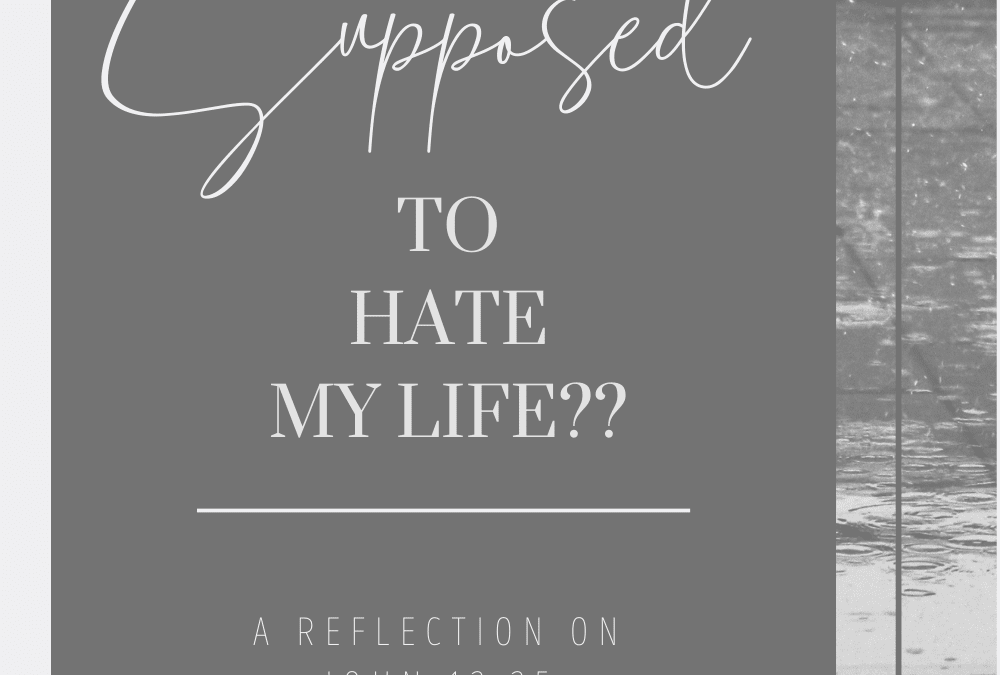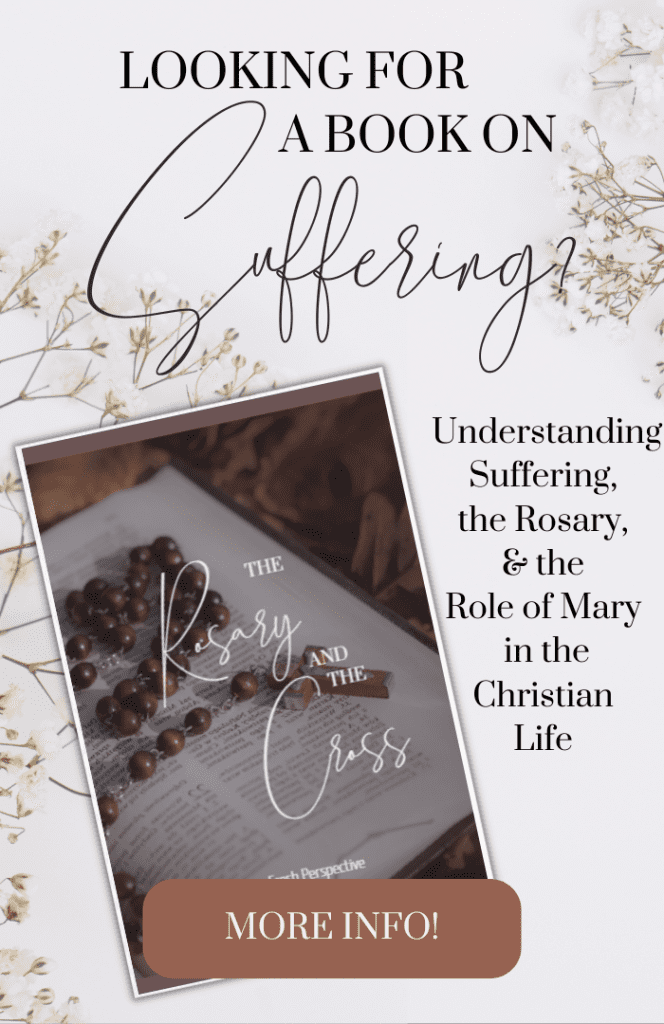Whoever loves his life loses it, and whoever hates his life in this world will preserve it for eternal life. – John 12:25
Hate. It’s a strong word.
I’m sure you’ve heard the watered down interpretation of this passage, they all say, “It just means not being ‘attached’ to this life. You can be rich and have/do anything you want as long as you profess to love God more.”
I get it. It sounds nice. It definitely makes this whole verse more palatable.
But, I wonder if our cursory reading and glossing over is doing this passage justice.
It couldn’t possibly advocate for depression or encourage hating yourself or any of the people or things in this life because after all aren’t we explicitly commanded to love them??
“Love your neighbor as yourself.” – Mark 12:31
So, we are left with the watered down version?
Why do I say watered down?
Well, because we think we get it. We’ve wholeheartedly adopted a “plausible explanation” that allows us to stop answering hard questions and remain comfortable sipping our coffee on the couch wrapped in our cozy blanket thinking, Sure, I’m willing to give up my comfort zone for heavenly bliss (ie. Something even more comfortable). But, when was the last time we actually tested that theory?
When was the last time you asked yourself if you loved hot showers more than God? What about sweets or second helpings? If you had to choose, would you be willing to give your entertainment, your sleep, or your wardrobe to Him for Him to do with as He wills?
Read also: For When You Just Don’t Love God…
We say the things we love are “no big deal, just a sign of self-expression”. We even think they are positive additions to who we are meant to be, after all God is the one who created you with this intense affinity for sushi, shoes, and piercings (or whatever your affinities are). At worst, we are completely convinced that giving them up would be a sort of betrayal of who He made us to be, and at best, that letting go of any of those things would be a rejection of His gifts. It feels absolutely wrong on every level to let go of the things we love.
But, it’s not exactly like that.
We aren’t just letting go of the things we love into a vacuum or a void. We aren’t saying that it is bad to love them. In fact, it is quite the opposite. We are saying, look at this good a beautiful thing that I love, it is worthy of being a gift… of offering as an oblation to the God I love more than the thing.
In the old testament, God required the first fruits of every family, every harvest, every flock, every income. He asked for sacrifice of the very best because it was a test of love, not because God is egotistical or because God doesn’t want us to have good things, but because it helps us to recognize where our affections lie. Why would I want heaven if I don’t love God?? And not just love Him in some sort of theoretical way, but enough to truly want to leave this world to be with Him for real??
In a practical sense then, if I love God more than these earthly gifts then it is an honor to present my choicest fruits to Him, as an opportunity for sharing, for gratitude, and for rejoicing together with Him in His bounty. It is when I find offering my best a challenge that I can come to realize where my heart lies.
Does my affection rest on the gift itself or on the Giver of the gift?
If gifts are meant to be a sign of love (love language – see advent retreat 😊) it becomes simple to see that attaching oneself to the gift as opposed to experiencing an increase in relationship with the giver becomes a rather severe distortion of the purpose of the gift. When we give back the gift to God, all we are simply doing is saying. Thank you for this beautiful treasure, I love You so much, I do not want to have it alone. I want to share it with You, the One whom my heart loves.
This attitude is critical, first, because gifts are very lonely and quickly degenerate into a fostering of entitlement and expectation when they go unshared (counterproductive to their purpose), and because it is a way to acknowledge the Giver and the purpose of the gift.
But if I give God back everything He has given me, if I keep nothing for myself, if I don’t have anything in this life that is my own to make me happy, then I will have nothing to live for, I will hate my life!
Bingo!
He who hates his life will save it….
This is why sacrifice is a kind of death. It’s a death to our own earthly happiness, our own pleasure, our own will out of trust that He will not abandon us if we share our good fortune with Him. This is why it is often called mortification, or death-to-self. It is a sort of voluntary death to material happiness or at least the intentional, and practical detachment therefrom. (You may likely still be blessed beyond measure but the offering if the first fruits is proof of our detachment)
We call it mortification, we call it sacrifice, we call it drinking the cup, and taking up our cross and following the master even to the cross, but it’s not really death, its simply saying “I love you (or want to love you) more than this thing”.
He that finds me, finds life, and shall have salvation from the Lord – Proverbs 8:35
Read also: Death-to-Self Resources
The essence of sin is disordered love – St. Francis of Assisi
This also explains so much about the Christian life. People think we are supposed to give things up because they are somehow bad (this is why so many well meaning Christians believe all things pertaining to our sensual/sexual nature are evil). But, we cannot offer up things that are “bad”, for then they would be unworthy offerings. Bad, mediocre, or empty gifts do not express love. That is why the things that we offer, our time, our money, our food, our physical pleasure, we offer them because they are the highest GOODS we can offer, not because they are evil.
When the rubber meets the road and we find ourselves forced to answer the question, do I love God enough to offer this gift to Him? Do I want Him more than my own life? (Obviously, we have to die in order to get to heaven) Do I trust that He will be enough to make me happy if I “sacrifice” my happiness to Him?
This is what it means to hate your life.
You have nothing left here that you love. You have given it all to Him. HE has become your life, your joy, your portion, and your cup. All earthly goods are nothing in comparison to the Love your heart longs for and the separation from that Love is almost unbearable.
So what is left, how do we go on living if we have offered Him back all our earthly loves?
This is when He becomes our life, when “it is no longer I who live but Christ who lives in me” (Galatians 2:20). This is when faith, hope, and purpose fuel us with fire, and love fans that fire into an unquenchable flame that is so much bigger than we could have ever imagined. This is when we become impervious to pain (because we have even given Him our comfort) and when we become inexhaustible driving forces of conviction and constancy, not of our own strength or even of our own desire but simply in the recognition of our desperation for the God who gives us joy.
Rejoice in the LORD always, again I say rejoice. – Philippians 4:4
Read also: 4 Necessary Elements of True Joy in the Lord


